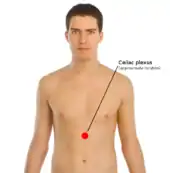
Getting the wind knocked out of you is an idiom that refers to the difficulty of breathing and temporary paralysis of the diaphragm caused by reflex diaphragmatic spasm when sudden force is applied to the upper central region of the abdomen and solar plexus.[1][2][3] This often happens in contact sports, from a forceful blow to the abdomen, or by falling on the back.
The sensation of being unable to breathe can lead to anxiety and there may be residual pain from the original blow, but the condition typically clears spontaneously in a minute or two.[4] Victims of such a "winding" episode often groan in a strained manner until normal breathing resumes. Loosening restrictive garments and flexing the hips and knees can help relieve the symptoms.[1][2]
References
- 1 2 McGown, Andy T. (2004-01-01). "Blunt Abdominal and Chest Trauma". International Journal of Athletic Therapy & Training. 9 (1): 40–41. doi:10.1123/att.9.1.40. ISSN 1078-7895.
- 1 2 Intravia, Jessica M.; DeBerardino, Thomas M. (2013-04-01). "Evaluation of Blunt Abdominal Trauma". Clinics in Sports Medicine. 32 (2): 211–218. doi:10.1016/j.csm.2012.12.001. ISSN 0278-5919. PMID 23522502.
- ↑ "What happens when you get winded?". BBC News. 28 September 2005.
- ↑ Barrett, Cassie; Smith, Danny (August 2012). "Recognition and management of abdominal injuries at athletic events". International Journal of Sports Physical Therapy. 7 (4): 448–451. ISSN 2159-2896. PMC 3414076. PMID 22893864.
Further reading
- MacAuley, D (2007). Oxford Handbook of Sport and Exercise Medicine. Oxford University Press. p. 572. ISBN 978-0-19-856839-1.
- Shultz, Sandra J.; Houglum, Peggy A.; Perrin, David H. (2005). Examination of Musculoskeletal Injuries. Human Kinetics. p. 567. ISBN 0-7360-5138-4.
- "Getting the Wind Knocked Out of You" at kidshealth.org